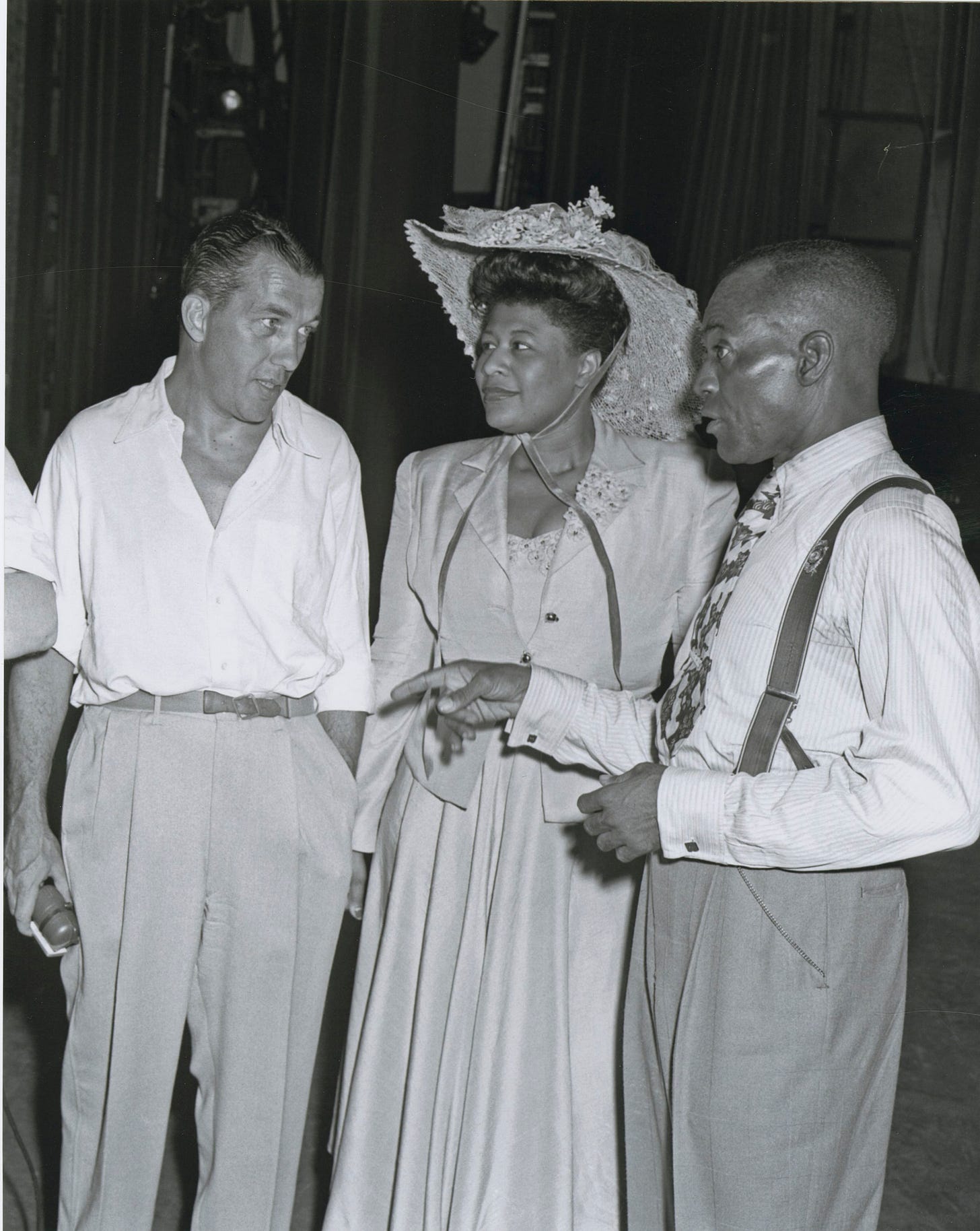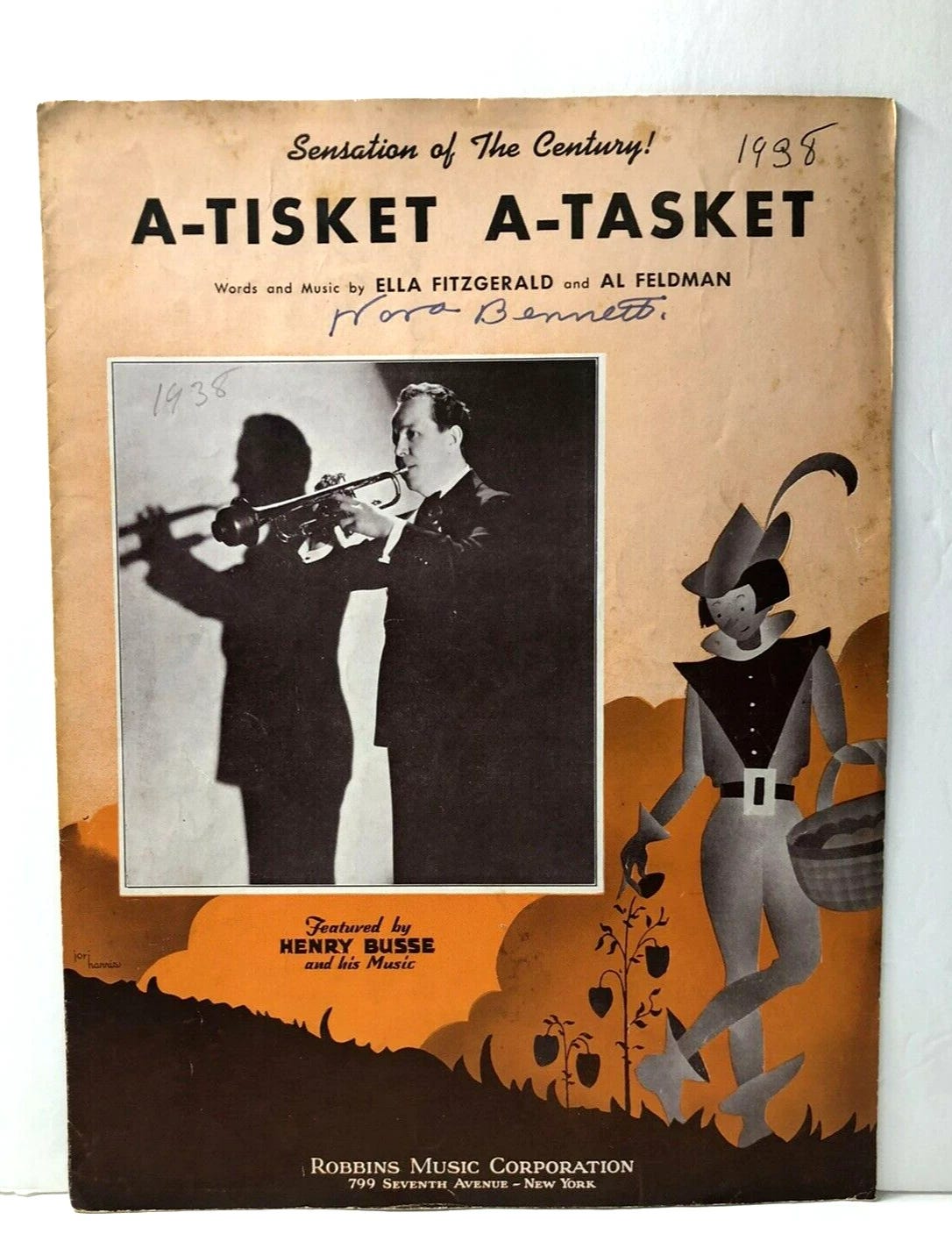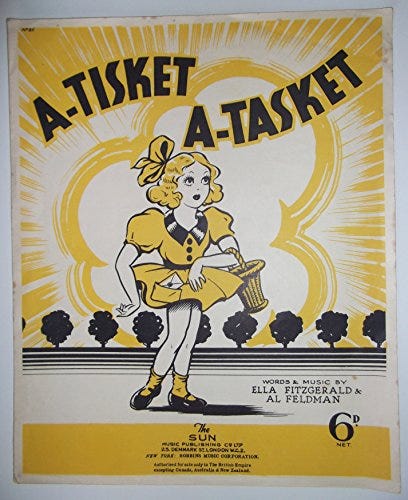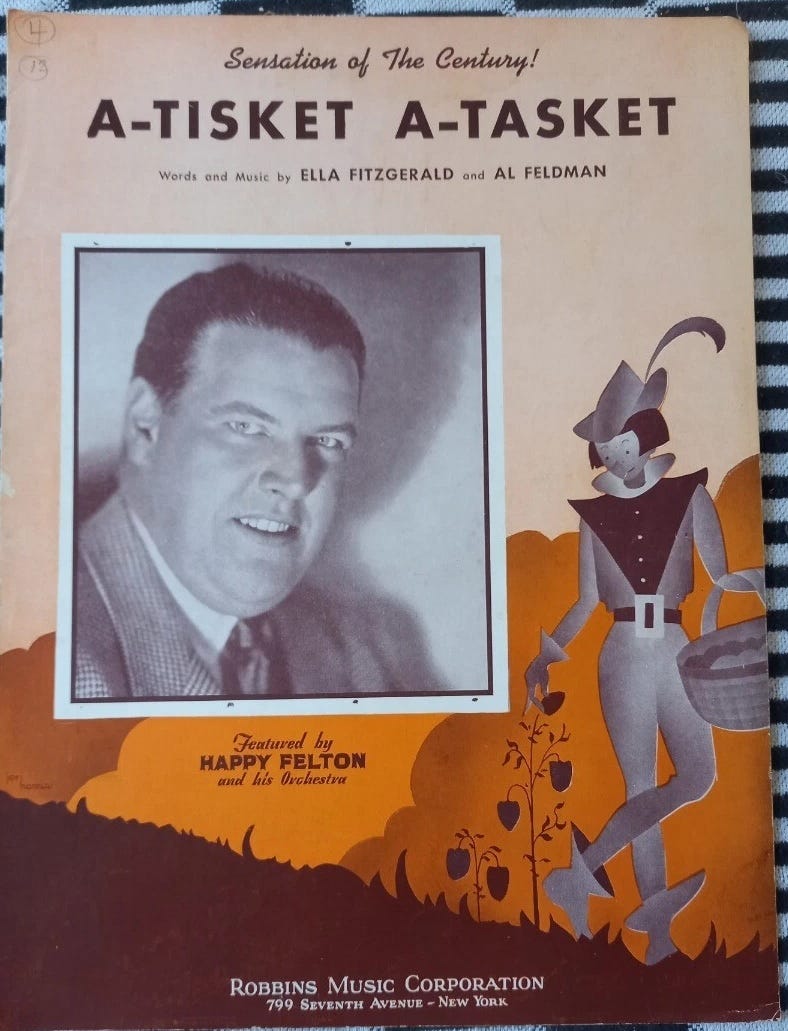Swinging Nursery Rhymes, Part 1: “A-Tisket A-Tasket”
Based on a traditional nursery rhyme, adapted by Ella Fitzgerald and Van Alexander (sometimes listed as Al Feldman)
SING! SING! SING!
(more info below - heard on KSDS Jazz 88.3 San Diego + Podbean)
A-Tisket A-Tasket - Swinging Nursery Rhymes!
(SSS #161 2025-08-16)
download: <or> play online: + Playlist:
Surprise! We start this story about “A Tisket A-Tasket” (and that seems to be the correct spelling and punctuation on the original 78 label and sheet music) not with Ella Fitzgerald, but rather, with Sarah Vaughan.
In the latter part of her career, Vaughan enjoyed doing a kind of shtick with her audiences where she would ask for requests; this was her major moment of interplay, of give-and-take with her fans in the house. Usually she would make a great show of listening to all of their requests, and acting like she was pondering them, deciding what to sing next. Then, she would make an even greater show of telling everyone that she had considered all their requests - but she wasn’t going to sing any of them. So there!
Still, once in a while, someone would come up with a request that Vaughan approved of and then she would actually sing it. There’s an excellent concert from Prague in 1978 where she offers a completely spontaneous version of “Once In a While,” accompanying herself at the piano.
One of the great such moments with Sarah occurs during a performance at Rosy’s in New Orleans, also in 1978. She finishes “Poor Butterfly," and then asks —for requests. We do not hear what the crowd is saying, since there’s no mic of any kind picking them up, but we do hear Sassy’s reaction. And what we hear is her uttering—in a surprisingly understated, matter-of-fact manner—“I’ll be damned!”
It turns out that someone in the house has just shouted a request for Vaughan to sing, “A-Tisket, a-Tasket”—hence her reaction. We don’t know if that someone was confusing her with Ella Fitzgerald or they were just being cute and actually wanted her to sing Ella’s greatest hit. Luckily for us, this was one of those occasions where she took the ball and ran with it, performing a brief impromptu chorus of “Tisket”—before which she says, she “thinks I’m Lena Horne!”
The humor is obvious to everyone at Rosy’s, except, perhaps the requester; “Tisket” was Ella Fitzgerald’s song, and perhaps the last thing in the world anyone should ask Sarah Vaughan to sing. It wasn’t Ella’s only hit, but it was her breakthrough number, the song that put her over from being merely a local favorite at the Savoy Ballroom in Harlem.

It’s been reported—I’m sorry to admit, even at least once by myself—that “Tisket” was the first major example of a traditional nursery rhyme jived up and transformed into a swing number, a hot flag-waver that the entire country and even the whole world could dance to. Yet it was far from the first—in fact I’m doing a whole program of “Swinging Nursery Rhymes” on my radio show Sing Sing Sing this week. There already were jazzed-up nursery rhymes as early as the 1920s, and the trend was well under way at the start of the swing era with “(If I had) Rhythm in my nursery rhymes” recorded by Jimmie Lunceford’s Orchestra, and Benny Goodman’s “Yankee Doodle Never Went to Town” both from 1935.

About 25 years ago, when I was doing notes for a package of Fitzgerald vocals with the Chick Webb Orchestra, I had the great fortune to interview Van Alexander (nee Al Feldman) who co-wrote the song with Ella and arranged it for the Webb band. Alexander confirmed that it was indeed Ella’s idea, and he essentially wrote it down and orchestrated it to her specifications — for which he was happy to receive 50 percent of the author credit.
Fitzgerald and Webb recorded “Tisket” for Decca in May 1938, and it immediately became one of the big hits of the swing era:
(Of course, it would be nonsense to claim that we know the exact chart positions that it achieved, for the simple reason that despite rampant false scholarship virtually everywhere on the world wide interweb, there were no actual across-the-board hit record charts this early.)
We do know that “Tisket” was a blockbuster, from press accounts as well the way that other bands picked up on it. The keyboardist-singer Erskine Butterfield, recording for Vocalion, was one, with a vocal credited to “Lu Blue”—yes, it’s the famous Blue Lu Barker (of “Don’t You Make Me High” fame). Two other roughly contemporaneous versions worth hearing, not least because they use different introductions and set up the song in very different ways, are those of the Red Norvo Orchestra featuring Mildred Bailey and the Tommy Dorsey Clambake Seven featuring Edythe Wright.
Bailey, who could affect a little-girl kind of a voice comparable to Ella, sings what sounds like the sheet music verse, which Ella never sang to my knowledge. (This version is from a commercial transcription, and is not the same performance as on the Mildred Bailey Mosaic package.)
Wright, on the other hand, doesn’t sound young or naive at all - she even sings “mother” instead of “mommy” which comes off as much more mature. In general, she sounds more like a grown-up woman singing a kid’s song for some seductive intent; and she enjoys considerable interplay with the main Dorsey reedmen, clarinetist Johnny Mince and alto saxophonist and (here) frog voice / novelty singer Skeets Herfurt. (Come to think of it, I interviewed both of them, but didn’t think to ask them about this particular song — go figure!)
I won’t go into every version of “Tisket,” of course—there are far too many, by bands and singers both Black and white—Teddy Wilson with Nan Wynn (not to mention Jonah Jones, Ben Webster, and Benny Carter), live radio performances by both Earl “Fatha” Hines at the Grand Terrace in Chicago and by Paul Whiteman’s Orchestra during that veteran bandleader’s “swing” phase.

.The August 21, 1938 recording by Fats Waller and his Continental Rhythm—done in the HMV studios in London—is notable, not only for Waller’s characteristically hysterical impromptu spoken interjections but also for the presence of several major British jazz players, including trombonist George Chisholm and future Latin headliner Edmundo Ros. The Continental Rhythm disc also illustrates how popular the tune was internationally — there are many versions from all over Europe. It could be that the nursery rhyme nature of the song made it comprehensible to non-English speakers; this wasn’t exactly Cole Porter or Ira Gershwin; Frenchmen, Spaniards, and Berliners alike could easily understand the narrative, such as it was.
We have numerous live versions by Fitzgerald from her big band years. Alas, while the song catapulted Fitzgerald and the Webb aggregation to national fame, the drummer had only a few brief months to enjoy his celebrity; by spring 1939 he was increasingly ill, and he died in June. (By the way, Stephanie Stein Crease’s recent biography of the legendary drummer is highly recommended.) This live rendition, preserved by Bill Savory (and in the Mosaic Records Savory package), is especially noteworthy: Fitzgerald guest stars with the white “house” band on the very popular Saturday Night Swing Club, and is joined by trumpet great Roy Eldridge and Webb himself.
The other “early” version by Fitzgerald that we can’t leave out is her cameo appearance in the 1942 Abbott and Costello comedy, Ride ‘Em Cowboy — one of her few appearances in a theatrical feature film. (St. Louis Blues and Let No Man Write My Epitaph would come much later.) Let’s not make too much of the way that Universal Pictures had her singing in the back of the bus — there are Caucasians placed behind her, and Bud and Lou themselves, as you will see, couldn’t even get in the bus at all. This might be described is a rare example of old Hollywood not throwing a great African American entertainer under the bus.
Nat King Cole never recorded “Tisket,” not exactly, but he interjected it into the middle of “Three Blind Mice” on one of his first great albums, King Cole for Kids, recorded in 1947. After the first chorus, rather than continuing with the familiar blind mice melody, the Trio detours into “Tisket” with rewritten lyrics for a tale of sightless rodents and female farmers — and there’s a high speed, high-pitched voice at the end, another high-tech innovation in the disc recording (pre-tape) era.
Even after the big band years, Fitzgerald occasionally sang “Tisket” on live concerts; though she had, in fact, graduated to the great songs of Porter, Gershwin, Rodgers & Hart, and company, she never completely outgrew “Tisket.” In 1957, she cut a whole new version as a 45 RPM single for Verve Records, in an entirely different arrangement, written and conducted by Frank De Vol. Be warned: this version is fairly kitsch-y, it’s a hot Latin take on the tune that employs Cuban-style percussion as well as a string section. (When I played it for my friend, the brilliant photographer Carol Friedman, she loudly exclaimed that it was like something Ricky Ricardo would play on I Love Lucy.)
Still, I love it.
Post script: In 2008, the young Canadian singer Nikki Yanofsky—13 at the time of recording—released a tribute album to the Great Lady entitled Ella…Of Thee I Swing. She e includes “Tisket,” but surprisingly she recreates the 1957 faux-Latin arrangement rather than the original 1938 Van Alexander / Chick Webb chart.
Next week — more swinging nursery rhymes — The sequel song, “I Found My Yellow Basket” (there actually were at least three other big band versions in addition to Fitzgerald and Webb) and “Mutiny in the Nursery.”
(Very special thanks to Elizabeth Zimmer & Dan Fortune for their expert proofing, hey!)
Sing! Sing! Sing! : My tagline is, “Celebrating the great jazz - and jazz-adjacent - singers, as well as the composers, lyricists, arrangers, soloists, and sidemen, who help to make them great.”
A production of KSDS heard Saturdays at 10:00 AM Pacific; 1:00 PM Eastern.
To listen to KSDS via the internet (current and recent shows are available for streaming) click here. Here is the running list of recent shows.
The whole series is also listenable on Podbean.com; click here.
SING! SING! SING!
A-Tisket A-Tasket - Swinging Nursery Rhymes!
(SSS #161 2025-08-16)
download: <or> play online: + Playlist:
Tony Bennett @ 99! 70 Years of Great Moments LIVE ! (1947-2016) (SSS #159 2025-08-02 )
download: <or> play online: + Playlist:
Frank Loesser & Burton Lane
(SSS #158A 2025-07-26)
download: <or> play online: + Playlist
Frank Loesser & Hoagy Carmichael
(SSS #158B 2025-07-26)
download: <or> play online: + Playlist
Frank Loesser & Jimmy McHugh
(SSS #158C 2025-07-26)
download: <or> play online: + Playlist
The Oscar Peterson Centennial - Oscar Meets the Swinging Singers!
(SSS #157 2025-07-19)
download: <or> play online: + Playlist:
ALAN BERGMAN at 97: A Birthday Present!
(SSS #011 2022-09-10)
download: <or> play online:
Bastille Day - Cole Porter in Paris
(SSS #156 2025-07-12)
download: <or> play online + Playlist
July 4 Special: Every State in the 48 is Great
(SSS #155 2025-07-05)
download: <or> play online:
With Seth McFarlane: “Lush Life: The Lost Sinatra Arrangements”
(SSS #154 2025-06-28)
download: <or> play online:
SLOUCHING TOWARDS BIRDLAND is a Substack newsletter by Will Friedwald. The best way to support my work is with a paid subscription, for which I am asking either $5 a month or $50 per year. Thank you for considering. (Thanks as always to Arlen Schumer for special graphics.) Word up, peace out, go forth and sin no more! (And always remember: “A man is born, but he’s no good no how, without a song.”)
Note to friends: a lot of you respond to my Substack posts here directly to me via eMail. It’s actually a lot more beneficial to me if you go to the Substack web page and put your responses down as a “comment.” This helps me “drive traffic” and all that other social media stuff. If you look a tiny bit down from this text, you will see three buttons, one of which is “comment.” Just hit that one, hey. Thanks!j
Slouching Towards Birdland (Will Friedwald's Substack) is a reader-supported publication. To receive new posts and support my work, consider becoming a free or paid subscriber.




Another great post !!! Don’t forget a buddy’s let’s all swing like the birdies do ! 😆
thanks for another great essay, Will! Love the Sarah Vaughn backstory - very very funny. Janis Siegel, the outstanding alto from Manhattan Transfer, does a very nice cover to “tisket” as well.